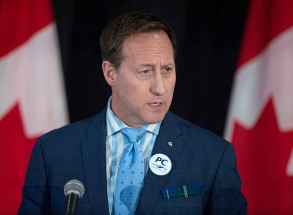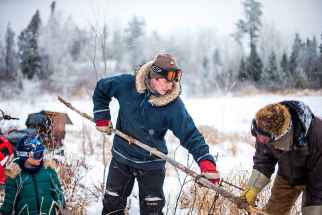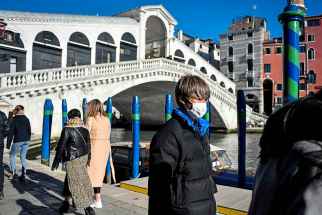Before test results known, premier says it’s not coronavirus
Read this article for free:
or
Already have an account? Log in here »
To continue reading, please subscribe:
Monthly Digital Subscription
$0 for the first 4 weeks*
- Enjoy unlimited reading on winnipegfreepress.com
- Read the E-Edition, our digital replica newspaper
- Access News Break, our award-winning app
- Play interactive puzzles
*No charge for 4 weeks then price increases to the regular rate of $19.00 plus GST every four weeks. Offer available to new and qualified returning subscribers only. Cancel any time.
Monthly Digital Subscription
$4.75/week*
- Enjoy unlimited reading on winnipegfreepress.com
- Read the E-Edition, our digital replica newspaper
- Access News Break, our award-winning app
- Play interactive puzzles
*Billed as $19 plus GST every four weeks. Cancel any time.
To continue reading, please subscribe:
Add Free Press access to your Brandon Sun subscription for only an additional
$1 for the first 4 weeks*
*Your next subscription payment will increase by $1.00 and you will be charged $16.99 plus GST for four weeks. After four weeks, your payment will increase to $23.99 plus GST every four weeks.
Read unlimited articles for free today:
or
Already have an account? Log in here »
Hey there, time traveller!
This article was published 28/02/2020 (2120 days ago), so information in it may no longer be current.
Premier Brian Pallister said Friday that the passenger taken off an airplane in Winnipeg Thursday did not have COVID-19.
“It’s not a coronavirus case,” said Pallister. He couldn’t offer specifics, or say whether the person who had a medical issue had been in China or any of the at-risk countries before boarding the WestJet flight from Vancouver to Winnipeg Thursday afternoon.
Paramedics in masks and protective gear took the passenger off the plane before other passengers were allowed to disembark, a WestJet spokesperson said Thursday. Emergency responders cleared the flight with the approval of the Public Health Agency of Canada, the airline spokesperson said.

Manitoba Health said Thursday that “all appropriate precautions and procedures” were followed, and that public health officials are monitoring the “emerging and rapidly evolving situation related to COVID-19.” On Friday, when asked to explain how the premier knows the person taken off the WestJet flight does not have the coronavirus — when provincial lab test results takes 24 hours and confirmation at the National Microbiology Laboratory takes 48 hours — a provincial spokeswoman didn’t explain but offered a brief statement:
“At this time, no laboratory-confirmed cases have been identified in the province and the overall risk to Manitobans remains low,” she said. The province will notify the public as soon as someone tests positive for COVID-19 at the Cadham Provincial Laboratory — where it would be termed a “presumptive” case — before it’s confirmed by the National Microbiology Lab, said another health department spokesperson.
On the front lines, the Winnipeg Fire Paramedic Service says it’s ready to deal with the virus if and when it arrives. It consulted with Shared Health and has a new protocol and followed it Thursday at the airport, said spokeswoman Erin Madden.
“As COVID-19 has spread and the countries where the virus has been identified has widened, our protocols have evolved,” said Madden. Crews responding to all incidents involving patients with flu-like symptoms are now taking personal protective precautions, collecting travel histories and advising hospitals accordingly, she said.
When 911 medical dispatch says a patient is experiencing an influenza-like illness — cough, fever, sore throat, runny nose, malaise, and respiratory symptoms consistent with respiratory infection — crews are reminded to don proper personal protection and to put an N-95 mask, surgical mask or oxygen mask on the patient on initial contact, she said.
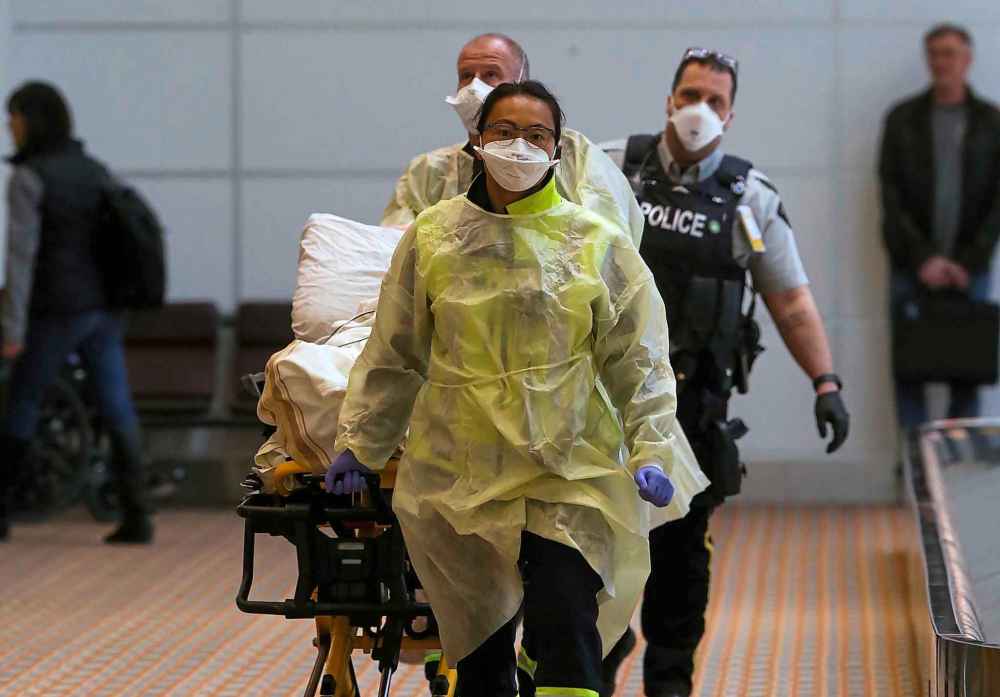
In such cases, paramedics ask the patient if they had close contact with a confirmed or probable case of COVID-19 within 14 days prior to becoming ill, if they had close contact with a person with flu-like symptoms who’s travelled to China, Hong Kong, Iran, Italy, Japan, Singapore, South Korea, Taiwan, Thailand or Vietnam within 14 days of feeling ill, or had laboratory exposure with a person who works directly with biological specimens known to contain COVID-19. If the patient answers yes to any of those questions, paramedics contact the hospital to ensure necessary isolation arrangement are made, said Madden.
After contacting or transporting someone with a flu-like illness, crews follow disinfecting procedures of their ambulances and equipment, she said.
Pallister said he’s confident Manitoba is “well-prepared” to deal with an outbreak if it occurs.
“I don’t think this is an unprecedented thing,” the premier said, noting Manitoba has dealt with outbreaks in the past. During the 2009-2010 H1N1 epidemic, Manitoba had more than 2,600 confirmed cases and 11 people died.
“The important thing is to learn from each experience,” said the premier. Provincial government departments are working together to prepare for a worst-case scenario with COVID-19, Pallister said, deferring to the Health Minister for details of that plan.
Meanwhile, fears over the economic impact of COVID-19 sent stock prices tumbling for a seventh consecutive day on Friday, resulting in the worst weekly decline for stocks since the 2008 financial crisis. In Manitoba, the province announced Friday that its budget will be released March 11.
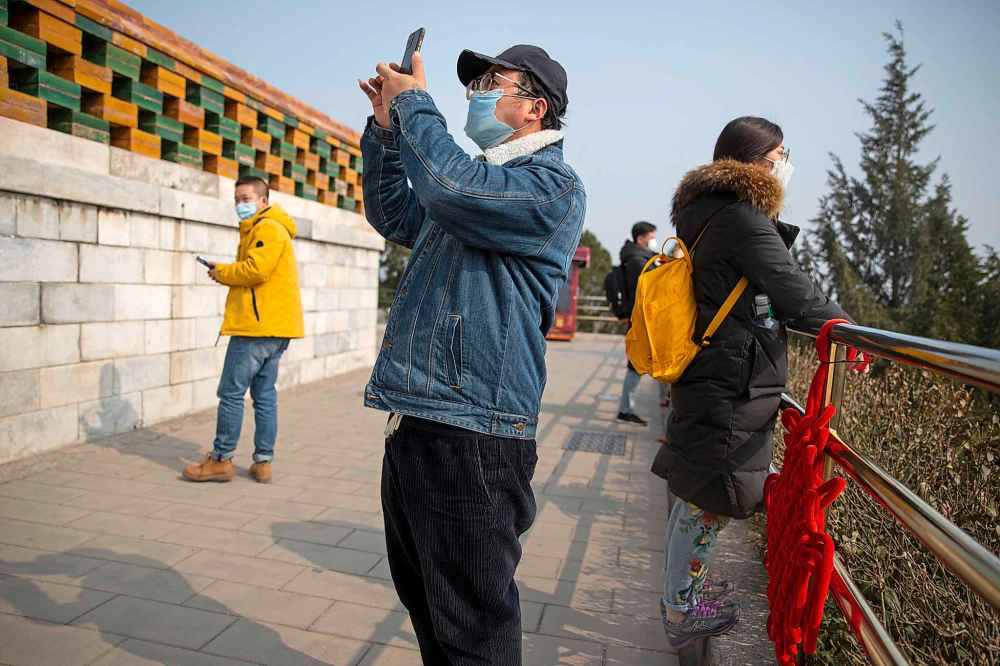
Pallister said the 2020 budget will make Manitoba stronger and better able to withstand a real health issue, not a “scare” like what happened Thursday at the airport.
“Just as a healthy body can repel disease better than an unhealthy one, a stronger province can find its way in challenging times better if it’s set the stage to be stronger,” Pallister said. “We’ll continue with this budget to move to become a stronger, more resilient province.”
carol.sanders@freepress.mb.ca

Our newsroom depends on a growing audience of readers to power our journalism. If you are not a paid reader, please consider becoming a subscriber.
Our newsroom depends on its audience of readers to power our journalism. Thank you for your support.






